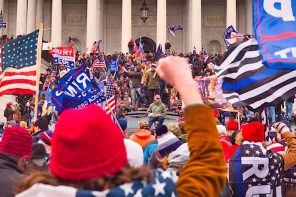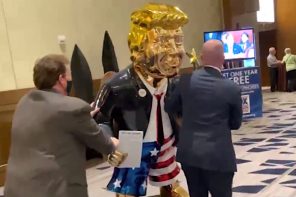One of President Biden’s final acts as US president was to grant clemency to American Indian Movement (AIM) activist Leonard Peltier (Turtle Mountain Ojibwe), who will be released into home arrest sometime this month. The 80-year-old Peltier, who suffers from diabetes and other health conditions, has spent the past 50 years in prison. The following day, one of President Trump’s first actions as president was to grant a blanket pardon to all those involved in the January 6 insurrection, including Jacob Chansley, better known as the QAnon Shaman (or just Q Shaman). Chansley, who’s been referred to as a symbol of the insurrection, had actually already been released from prison after his 41-month sentence was shortened last year. While it may look, superficially, like some kind of ideological “balance” has been struck, the details reveal a far more disturbing reality: that justice for Leonard Peltier and the whitewashing of Chansley’s (and his co-conspirators’) crimes are mutually exclusive.
Back in January 2021, Chansley was, among other things, clearly “playing Indian” in a headdress made of buffalo horns, coyote fur, face paint, feathers, and beads, sometimes beating a fake drum. As Cherokee scholar Joseph Pierce wrote at the time: “It is an image of violent appropriation—a warning and a reminder. White supremacists like [Chansley] pose as Indians in order to create an image of themselves as inseparable from the land itself.”
Chansley’s performance at the Capitol certainly qualifies as cultural appropriation, which is closely tied to land theft and genocide. All of these practices treat Native peoples as disposable and replaceable; as historian Patrick Wolfe argues, settler colonialism follows a “logic of elimination.”
In order to understand Chansley’s appropriation of Indigenous spirituality we need to know about a devastating, decades-long policy known as the Civilization Regulations. From 1883-1934 real Indigenous ceremonies were outlawed and severely punished, forcing Indigenous communities to go underground, to mask their ceremonies as Christian, or otherwise adapt. Congress responded to the devastating effects of this policy with the 1978 American Indian Religious Freedom Act (AIRFA), which grants protection to Native peoples performing traditional ceremonies, as well as their access to sacred sites. But this law was only enacted after a decade of AIM activism, the movement to which Peltier belonged, a movement that fought for treaty rights and Indigenous sovereignty. In other words, the opposite of everything Chansley represents, including the settler fantasy to become Native.
The Fraternal Order of Police and the International Association of Chiefs of Police expressed deep concern in response to both presidents’ commutations in a statement that reads, in part:
The IACP and FOP are deeply discouraged by the recent pardons and commutations granted by both the Biden and Trump administrations to individuals convicted of killing or assaulting law enforcement officers… Crimes against law enforcement are not just attacks on individuals or public safety — they are attacks on society and undermine the rule of law.
While Jacob Chansley was not accused of directly assaulting law enforcement officials at the Capitol and Leonard Peltier was convicted of killing two FBI officers on the Pine Ridge reservation in 1975 (in the aftermath of the Wounded Knee occupation), Peltier has a far stronger case for clemency. The result of decades of activism, it has been supported by tribal nations, lawmakers, human rights organizations, and political and religious leaders such as Nelson Mandela and Pope Francis, among others. Even James Reynolds, the former US Attorney who oversaw Peltier’s case, has called for his pardon, admitting that Peltier didn’t receive a fair trial (evidence in his favor was withheld) and that it was impossible to prove who shot the federal agents.
Nevertheless, Peltier’s sentence was only commuted (he wasn’t pardoned) and he’s to serve the rest of his time—the rest of his life—under home arrest. Chansley, on the other hand, received a full pardon, which means all his rights are being restored, including voting and—notably—gun ownership. Indeed, right after his pardon, Chansley tweeted his celebratory response:
I got a pardon baby! Thank you President Trump! Now I am gonna buy some motha f***in guns! I love this country! God Bless America.
Peltier, after his commutation was announced, said in a statement:
It’s finally over—I’m going home. I want to show the world I’m a good person with a good heart. I want to help the people, just like my grandmother taught me.
In twenty-first century America, playing Indian is rewarded, while Indigenous struggles for sovereignty and for religious freedom are still suppressed. And the two are, in fact, tightly connected. Freedom for the QAnon Shaman and justice for Leonard Peltier are mutually exclusive.





